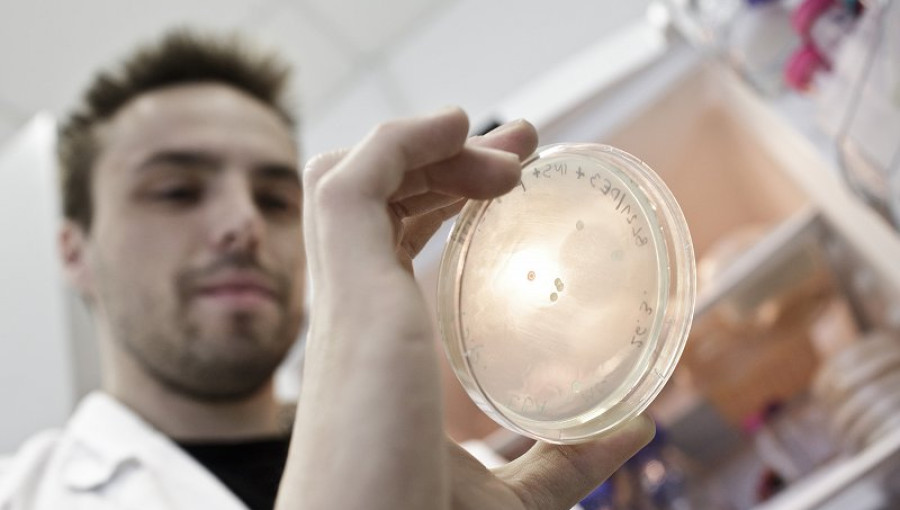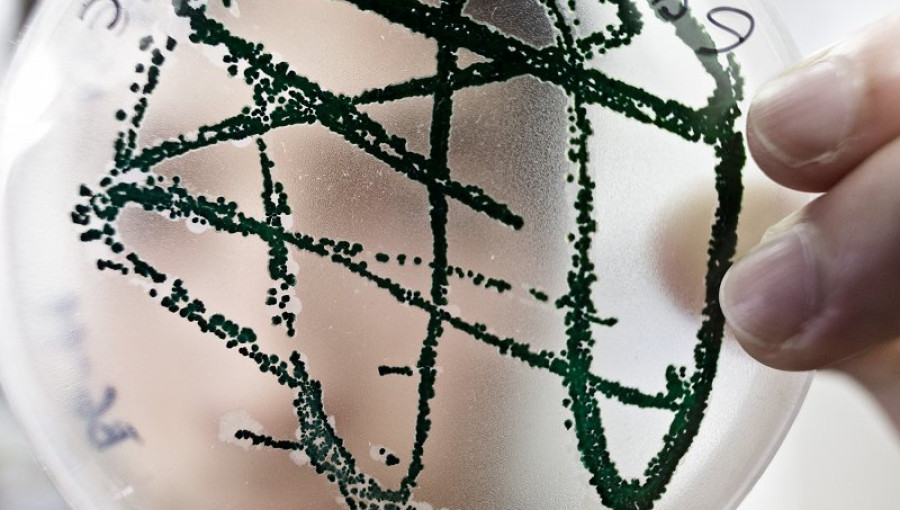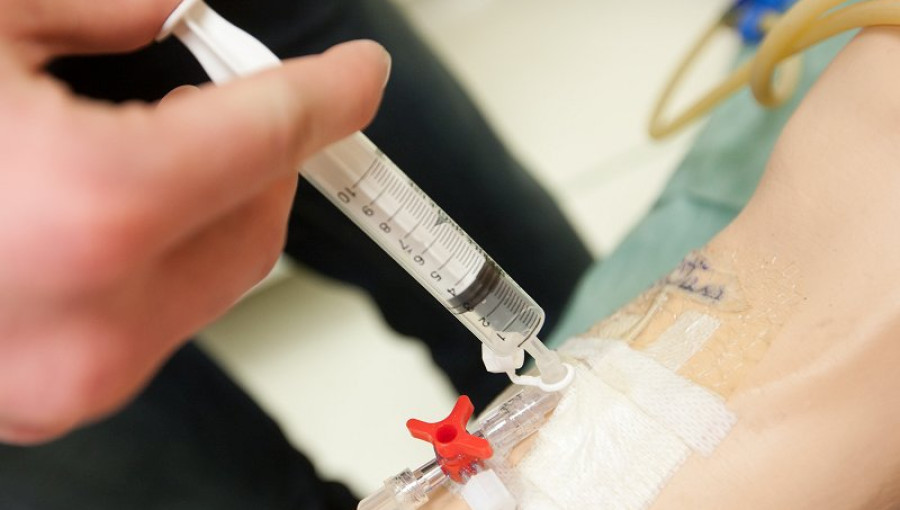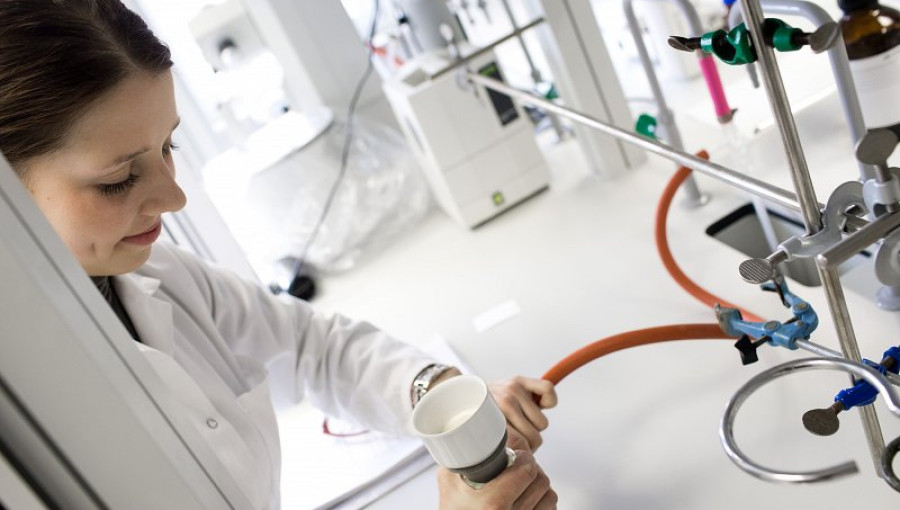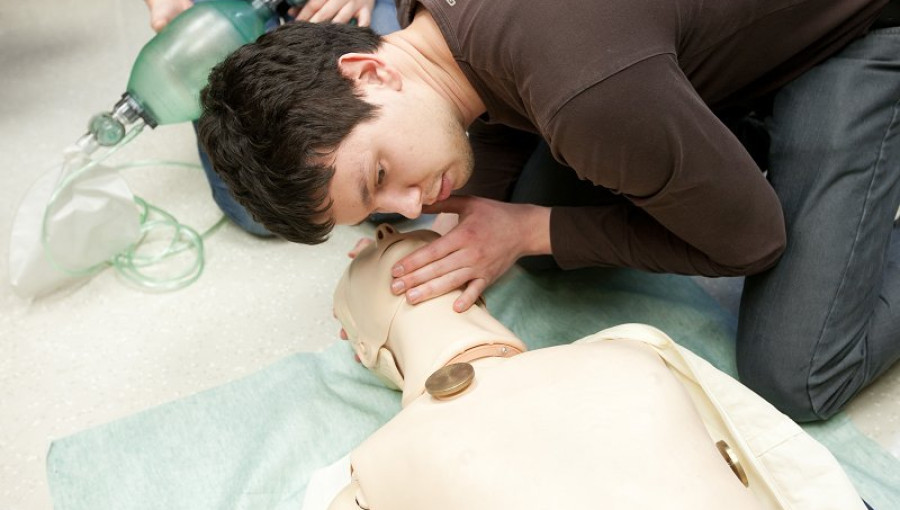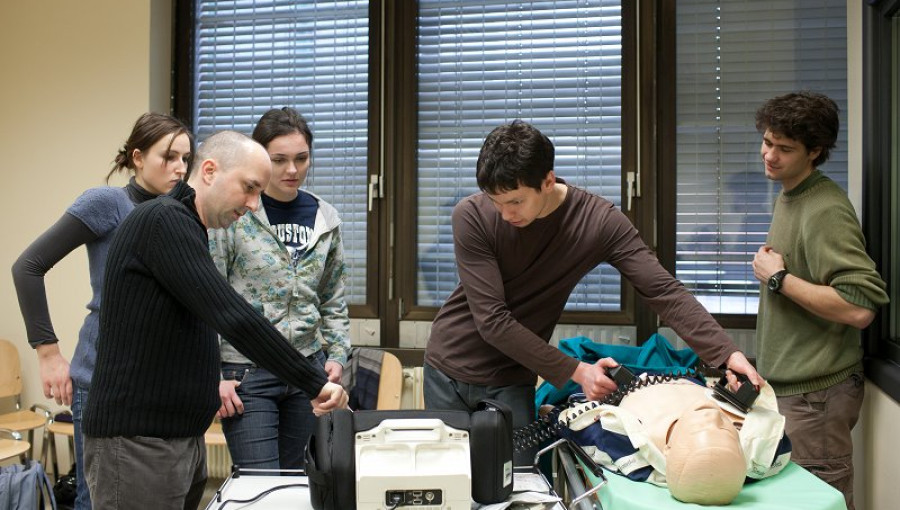Natural sciences
Faculty of Natural Sciences and Engineering
The research activities of the Faculty of Natural Sciences and Engineering at the University of Ljubljana (UL NTF) are interdisciplinary. It covers the fields of natural sciences, engineering and arts, where it integrates research:
- Matter (geology, mining),
- organic and inorganic materials (textiles, graphics, metals, non-metals, composites),
- manufacturing and processing technologies (textile and graphic technology, geotechnology, metallurgy),
- information technologies,
- textile and graphic materials design,
- fashion design, and
- environmental protection.
Scientific, research and artistic work is carried out in four departments of the UL NTF, namely:
- Department of Geology (OG),
- Department of Materials and Metallurgy (OMM),
- the Department of Geotechnology, Mining and Design (OGRO), and
- Department of Textiles, Graphics and Design (OTGO).
Researchers work in 13 research groups. The research work comprises basic, applied and development research funded by public funds from the Republic of Slovenia, the European Community, other international sources and funds obtained from the market. The NTF runs seven research programmes funded by the Public Agency for Research of the Republic of Slovenia (ARRS). For five research programmes, the NTF is the lead research organisation (RO), for two of them the participating RO.
Within the ARRS-funded programmes, the RIC UL-NTF Research Infrastructure Centre (RIC UL-NTF) is also operational, which includes all of the NTF's major equipment and provides expert and instrumental support for research. The RIC UL-NTF is included in the Network of Research Infrastructure Centres of the University of Ljubljana (MRIC UL).
Faculty of Biotechnology
The research activities of the Faculty of Biotechnology at the University of Ljubljana (UL BF) cover a broad spectrum of biotechnological sciences (life sciences). Researchers at the Faculty are involved in both basic and developmental research, and they collaborate extensively with practice. In addition to the basic biological sciences, their work is mainly characterised by the agri-food and forest-wood value chains and natural resource management. The research work of the Faculty of Biotechnology thus includes the fields of applied botany, genetics, microbiology and biotechnology.
Research in agronomy and animal sciences covers the spectrum from engineering, optimisation of the production and processing of plant and animal food and feed, zootechnics, genetics, pedology, typology, classification and evaluation of the Slovenian landscape, urban planning, landscape architecture and urban ecology.
Economics and public policies in the management of natural resources, especially in agriculture and forestry, are also becoming increasingly important.
Another nationally important area is nutrition and food technology, which includes the development of advanced food technologies, alternative packaging technologies, food biotechnology, food safety and quality control, nutrition, nutrition and the development of food supplements.
Forestry researchers study the many social, environmental and economic functions of forests. Forests produce timber, which is one of our most important renewable resources. In this field, they are working on the knowledge of existing materials and the development of new wood-based composites. In parallel, they are studying the possibilities of using them in the furniture and construction industries, with an emphasis on determining their service life when used outdoors. They are also looking at applications of wood and other plant tissues in next generation biorefineries.
Research work at the UL BF is organised in 22 research programmes and 48 research groups.
Faculty of Pharmacy
The Faculty of Pharmacy has six Chairs, which are the basic organisational units for teaching and scientific research, and an Institute of Pharmacy, which carries out basic and development projects to meet the current needs of the pharmacy profession:
Faculty of Chemistry and Chemical Technology
Scientific and research work at the Faculty of Chemistry and Chemical Technology of the University of Ljubljana (UL FKKT) is fundamentally linked to postgraduate education, as this is the only way the Faculty can ensure internationally competitive studies. Research in chemistry covers current areas in inorganic and organic synthesis, the study of inorganic and organic compounds, analytical chemistry, physical and biophysical chemistry, and various branches of biochemistry such as enzymology, molecular genetics and genetic engineering.
Chemical engineering research covers process development for inorganic and organic products and materials, reaction engineering, transport phenomena, rheology, bioengineering, ecological engineering, etc.
Research work is also related to industrial issues, especially for the chemical, pharmaceutical, food and biotechnology industries, civil engineering, environmental protection, etc. Interdisciplinary research between different faculties of Slovenian universities and other Slovenian scientific institutions, as well as international links within the framework of international projects and cooperation with foreign universities or research laboratories, are also important.
The basic research units at UL FKKT are the chairs:
- Chair of Analytical Chemistry (AL)
- Chair of Inorganic Chemistry (AK)
- Chair of Biochemistry (BIO)
- Chair of Physical Chemistry (FK)
- Chair of Organic Chemistry (OK)
- Chair of Chemical Process, Environmental and Biochemical Engineering (KPOBI)
- Chair of Materials and Polymer Engineering (MPI)
- Chair for Occupational, Process and Fire Safety (PPPV)
Faculty of Mathematics and Physics
The Faculty of Mathematics and Physics of the University of Ljubljana (UL FMF) comprises the Department of Physics and the Department of Mathematics. The Faculty fosters basic, applied and developmental research and strives to achieve excellence in all fields.
In physics, researchers work in the following subfields:
- Solid State Physics,
- Theoretical Physics,
- Soft Matter Physics,
- Astronomy,
- Meteorology,
- Medium- and low-energy physics,
- Experimental elementary particle physics,
- Optics,
- Biophysics,
- Medical Physics,
- Nuclear Engineering
Research in mathematics is carried out in the following subfields:
- Analysis,
- topology,
- numerical and computational mathematics,
- algebra,
- graph theory, and
- probability calculus and statistics.
The Faculty obtains research funding from national and international research calls. A major achievement of the Faculty is the funding of two projects by the European Research Council (ERC); the ERC Starting Grant was awarded to Prof. Dr. Nedjeljka Žagar, the first in Slovenia, and is aimed at encouraging young talented research leaders to start their independent research careers. The ERC Advanced Grant was awarded in 2016 to Prof. Tomaž Prosen, PhD, and is aimed at excellent researchers at the stage of their career when they have already become scientific leaders with a distinguished research record.
Faculty researchers play a leading role in major international scientific collaborations (e.g. the Belle Collaboration for Basic Particle Physics Research in Tsukuba, Japan, the Large Hadron Collider in Cern, Switzerland and the Thomas Jefferson National Accelerator Facility, Newport News, USA).
The Faculty collaborates with both Slovenian and international universities and institutions with which it has close research contacts.
Faculty of Medicine
-
The Faculty of Medicine of the University of Ljubljana conducts research activities in the field of medical sciences within the framework of departments, institutes and centres:
Chairs:
- Chair of Anaesthesiology and Critical Care
- Chair of Maxillofacial and Dental Orthopaedics
- Chair of Dermatovenerology
- Chair of Family Medicine
- Chair of Physical and Rehabilitation Medicine
- Chair of Gynaecology and Obstetrics
- Chair of Infectious Diseases and Epidemiology
- Chair of Internal Medicine
- Chair of Public Health
- Chair of Surgery
- Chair of Maxillofacial and Oral Surgery
- Chair of Microbiology and Immunology
- Chair of Neurology
- Chair of Orthopaedics
- Chair of Ophthalmology
- Chair of Oncology
- Chair of Otorhinolaryngology
- Chair of Pathology
- Chair of Paediatrics
- Chair of Paediatric and Preventive Dentistry
- Chair of Psychiatry
- Chair for Diagnostic Imaging
- Chair of Forensic Medicine and Deontology
- Chair of Dental Prosthodontics
- Chair of Oral Diseases and Periodontology
- Chair for Dental Diseases and Normal Dental Morphology
Institutes:
- Institute of Anatomy
- Institute of Biophysics
- Institute of Biochemistry
- Institute of Cell Biology
- Institute of Biostatistics and Medical Informatics
- Institute of Pharmacology and Experimental Toxicology
- Institute of Physiology
- Institute of Histology and Embryology
- Institute of Microbiology and Immunology
- Institute of Pathology
- Institute of Pathological Physiology
- Institute of Forensic Medicine
- Institute of the History of Medicine
Centres:
- Centre for Electron Microscopy
- Centre for Functional Genomics and Biochips
- Medical Centre for Molecular Biology
- Central Medical Library
- Computer Information Centre
- Department of Dental Medicine
- Centre for the Development of Teaching
- Medical Experimental Centre (MEC)
- Centre for Developmental Neuroscience
- Centre for Public Health
- Centre for Clinical Physiology
Veterinary Faculty
In addition to basic education and research activities, it offers continuing education in veterinary medicine and carries out activities in the regulated field of veterinary medicine, as mandated by the Ministry of Agriculture and the Environment for the needs of veterinary, health and market inspection. The Veterinary Faculty of the University of Ljubljana also includes the National Veterinary Institute, which carries out laboratory diagnostics of pathogens, microbiological contaminants, toxins and spoilage agents in food and water for the needs of animal keepers and breeders, veterinary practices, producers of food of animal origin and feed, and the processing and pharmaceutical industries.
It collaborates with external partners in basic and applied research in the broad field of biomedicine. In addition to laboratory diagnostics, it has well-developed research in neuroscience and behavioural neurobiology, the study of G protein-coupled receptors, which are targets for many drugs, electrophysiological research, genomic research, the development of advanced new therapies using stem cells, the development of cancer treatments using electrogenic and electrochemotherapy, veterinary dental medicine, and more.
It carries out research in the following areas:
Laboratory diagnostics and analysis; possibilities for studies in chemical analytics; biochemical analysis of blood, urine, milk and other body fluids; molecular biological methods, serological diagnostics, parasitological diagnostics; possibilities for toxicological studies, clinical studies, research using laboratory animals.
Other operational, developmental and educational work is carried out through institutes and clinics:
Faculty of Health Sciences
Research is an integral part of the development of the health professions. The Faculty of Health Sciences of the University of Ljubljana's research work is particularly multidisciplinary, which is facilitated by the structure of its research staff. The medium- and long-term objectives of the Faculty of Health are aimed at increasing the volume of scientific research work in the study of health maintenance, reduction of the consequences of injuries and diseases, and health ecology.
The research work covers a variety of areas, including research on the concept of healthy future settlements, homeostasis from the perspective of nutrition, lifestyle and environmental factors, evaluated through fundamental and novel mechanisms of health (intercellular communication in health and disease). Methods are being developed to trace systems at the level of cells, tissues, organisms and social systems, thus developing a holistic approach to integrating different research areas such as nutrition, lifestyle, environment and mechanisms of health.
The Faculty of Medicine pays particular attention to the development of international research collaborations, linking up with various universities and research institutions around the world. Experts from all disciplines of the Faculty of Health are competently involved in the process of technological and non-technological innovation, especially in the fields of biomedicine, eco-Slovenia, smart homes and smart factories, and to a lesser extent smart cities and energy and energy systems. In value chains and networks, they can be a link between technology companies, science and technology research centres and users from all social and age groups (children, adolescents, active employees, elderly) in the areas of quality growing up, work, living, nutrition, drinking water, health (preventive and curative health programmes), ageing and well-being.
Laboratories:
- Biomechanical Laboratory
- Microbiology Laboratory
- Radiology Laboratory
- Physiotherapy Laboratory
- Laboratory for Facility and Process Hygiene
- Laboratory for the study of oxidative stress
- Air pollution research laboratory
- Clinical Biophysics Laboratory
Chairs:
- Chair of Midwifery
- Chair of Occupational Therapy
- Chair of Physiotherapy
- Chair of Orthotics and Prosthetics
- Chair of Biomechanics
- Chair of Radiological Technology
- Chair for Health Ecology and Surveillance
- Chair of Public Health
- Chair for Biomedicine in Health
- Chair of Health and Sanitary Microbiology
- Chair of Nursing
- Chair of Health Education
- Chair for Social Aspects of Health and Health Care

